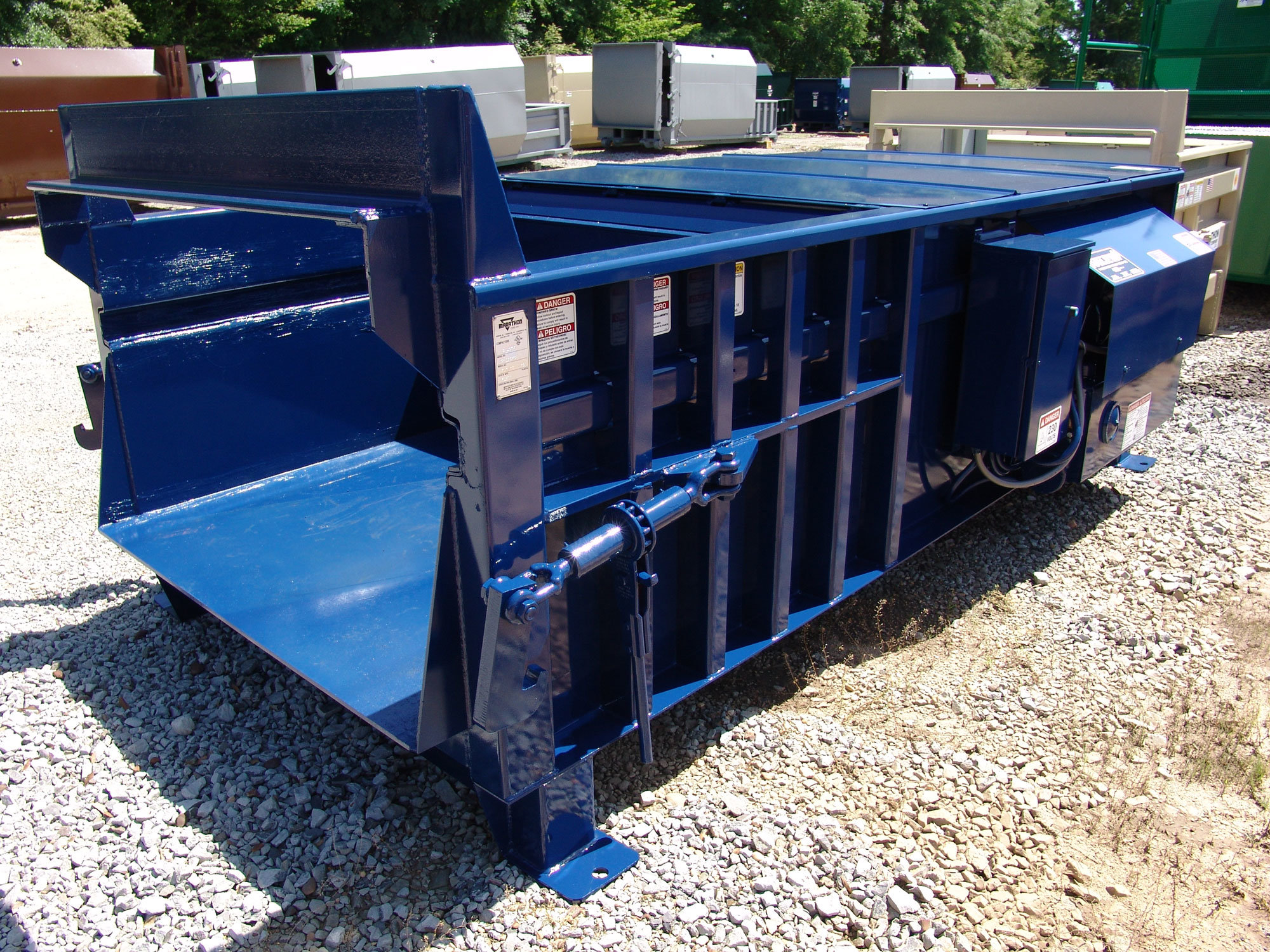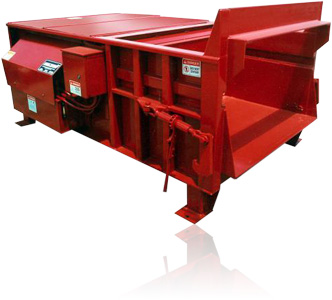Just How Waste Equipment Enhances Efficiency in Garbage Compactor Operations
Waste Equipment plays an essential function in enhancing the effectiveness of garbage compactor procedures. By using advanced sensing units and automation, these systems enhance compaction cycles and keep track of load capabilities effectively. This integration not only conserves power but likewise decreases pick-up regularity and associated costs. As companies increasingly adopt these technologies, the ramifications for operational sustainability and administration strategies become more clear. What other advantages might emerge from these developments in waste Equipment?
The Duty of Advanced Sensors in Compaction Performance
Advanced sensors play an important role in boosting the efficiency of garbage disposal. These advanced devices check numerous parameters, including load ability, wetness degrees, and compaction cycles, enabling for real-time modifications. By accurately evaluating the amount of waste, sensors allow compactors to optimize their operation, guaranteeing that power consumption is decreased while making best use of the quantity of waste refined.
Advanced sensing units add to anticipating maintenance by determining potential issues before they lead to Equipment failing. This positive strategy not just decreases downtime yet additionally expands the life-span of the compactor. Furthermore, information accumulated from these sensors can be evaluated to enhance functional techniques, leading to improved waste administration practices. On the whole, the combination of sophisticated sensors in garbage compactors considerably improves their efficiency and operational performance, converting right into expense financial savings and a more lasting approach to lose disposal.
Toughness and Layout: Products That Matter
The resilience and design of garbage compactor hinge considerably on the materials utilized in their construction. High-grade steel is frequently the main selection, offering toughness and resistance to put on and tear. This durable product endures the enormous pressure put in during compaction, guaranteeing long life and reliability. Furthermore, parts such as hydraulic systems are usually crafted from corrosion-resistant alloys to avoid deterioration gradually, enhancing operational performance.
Layout also plays a critical duty in performance; strategic supports and ergonomic shapes can substantially impact performance. Suppliers frequently focus on modular designs, permitting for easier upkeep and repair work. Innovations in finishing technologies, such as powder covering, boost resistance to environmental elements, consisting of wetness and chemicals. Eventually, the mindful choice of products not just boosts the structural integrity of garbage disposal however also contributes to their overall efficiency and efficiency in waste administration procedures.
Automation and Smart Innovation in Waste Equipment

In addition, automated compactors can optimize compaction cycles based on the quantity of waste, making the most of space and enhancing functional performance. Integration with mobile applications permits customers to monitor and manage compactors from remote places, boosting comfort and responsiveness. By adopting these innovations, waste management companies can not just boost their functional workflows yet also add to more sustainable techniques by lessening waste and maximizing resource usage. Generally, automation and smart modern technology stand for a substantial jump forward in the efficiency of garbage disposal operations.
Data Analytics for Enhancing Waste Administration
Utilizing data analytics offers waste monitoring companies a powerful device for optimizing operations and enhancing performance. By collecting and evaluating information from numerous sources, such as compactor performance metrics and waste generation patterns, firms can gain beneficial understandings. These understandings allow them to make informed decisions concerning collection routines, compactor use, and upkeep demands.
Predictive analytics can anticipate waste generation trends, permitting firms to allot sources a lot more successfully and prevent possible overflows or underutilizations of Equipment. Real-time surveillance through data analytics also improves the capability to respond swiftly to functional challenges, decreasing downtime and enhancing solution integrity.
Additionally, incorporating information analytics with existing waste administration systems cultivates a society of constant renovation. By tracking and determining ineffectiveness performance in time, business can improve their procedures and take on best practices, inevitably bring about a much more effective and sustainable waste monitoring strategy.
Price Cost Savings Through Enhanced Operational Effectiveness
By lessening and enhancing procedures waste, companies can attain significant price financial savings in their waste management processes. Boosted functional efficiency in garbage disposal minimizes the regularity of pick-ups, bring about reduced transport expenses. In addition, progressed waste Equipment permits for maximum compaction, making the most of container ability and decreasing the need for added bins.
This raised effectiveness not this contact form only reduces waste disposal charges yet also expands the lifespan of Equipment, decreasing maintenance costs. Automated tracking systems provide real-time data, permitting for proactive changes in waste handling, which can in addition enhance performance and minimize unexpected expenses.
In addition, robust training programs for team on Equipment use can result in boosted operational methods, you can look here further driving down prices. Ultimately, the combination of efficient waste Equipment cultivates an affordable waste management technique that benefits companies economically while making sure smoother operations.
Environmental Impact: A Lasting Technique to Waste Monitoring

Furthermore, carrying out recycling initiatives along with compaction procedures allows companies to draw away products from land fills, promoting circular economy principles. Services that adopt environmentally pleasant methods not only boost their company duty yet also allure to progressively eco-conscious consumers. By focusing on sustainability in waste monitoring, companies can attain a double benefit: enhancing functional effectiveness while proactively adding to ecological preservation. This well balanced approach placements organizations as leaders in lasting practices, promoting a much healthier world for future generations.
Often Asked Questions
Exactly How Typically Should Waste Equipment Be Kept for Ideal Performance?
The frequency of upkeep for waste Equipment generally relies on usage and manufacturer referrals - Industrial waste compaction equipment. Generally, evaluations must take place quarterly, with thorough maintenance every year to assure peak efficiency and protect against potential failures or inefficiencies
What Kinds of Waste Can Be Processed in Trash Compactors?
Garbage compactor can process various kinds of waste, consisting of cardboard, paper, plastics, and non-hazardous food waste. However, individuals must prevent condensing unsafe products, metals, and liquids to ensure safe and efficient procedure.
Are There Safety Functions in Modern Garbage Compactors?
Modern garbage compactor frequently include safety functions such as automatic shut-off devices, emergency situation stop buttons, and sensing unit systems (Industrial waste compaction equipment). These improvements are More hints created to safeguard users from potential threats throughout procedure, promoting a more secure working environment
Just How Does Waste Equipment Effect Labor Requirements?
The effect of waste Equipment on labor demands is substantial; it often minimizes the need for manual work, boosting and streamlining processes performance. Consequently, fewer workers are required, allowing companies to assign resources extra efficiently.
What Is the Typical Life-span of a Garbage Disposal?
The average life-span of a garbage compactor generally ranges in between 10 to 15 years, depending on usage, maintenance, and ecological aspects. Regular servicing can extend this life expectancy, making sure optimal efficiency and reliability throughout its operational years.
By embracing these modern technologies, waste management firms can not just improve their functional process however also contribute to even more sustainable practices by decreasing waste and enhancing resource usage. By streamlining procedures and lessening waste, business can attain significant expense savings in their waste management procedures. Lasting waste administration methods, particularly in garbage compactor operations, add significantly to lowering land fill waste and lowering carbon impacts. Modern waste Equipment is designed to optimize compaction, thereby reducing the volume of waste requiring disposal. Garbage compactors can refine various types of waste, including cardboard, paper, plastics, and non-hazardous food waste.